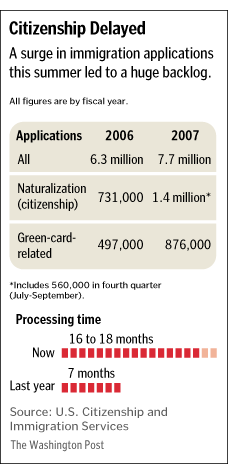Massive New Citizenship Backlog the Latest Voter Suppression?
A Washington Post report that the Bush administration is facing a massive backlog of hundreds of thousands of applications for U.S. citizenship is sadly unsurprising. After all, as the Katrina disaster and new passport fiasco demonstrated, incompetence is the hallmark of President Bush's Department of Homeland Security. But with the news that hundreds of thousands of immigrants - many of them Hispanic - may be unable to vote in the 2008 elections, Americans can be forgiven for suspecting something more sinister at work.
The new citizenship "frontlog" is largely the result of a steep increase in application fees. After July30, 2007, the processing fee, which now includes the cost of electronic fingerprinting, jumped over 50% from $410 to $675. The new fees, combined with immigrant anxiety over the tenor of the immigration debate in Washington, produced a deluge of new citizenship applications to the U.S. Citizenship and Immigration Services (USCIS). The volume swelled to 1.4 million between October 2006 and September 2007, a doubling from 731,000 the previous year. As a result, the naturalization process that once took five months to complete is now forecast to last 16 to 18 months.
Long enough, that is, to potentially keep hundreds of thousands of new, primarily minority voters from the ballot box in 2008.
Coming at a time when Hispanic voters are returning to the Democratic Party (in part due to anti-immigration zeal of the Republicans), administration officials were quick to deny political motivations for the potential disenfranchisement of new American citizens:
"I really want to target the elections," USCIS Director Emilio T. Gonzalez told the Associated Press in an interview published Tuesday. "I really want to get as many people out there to vote as possible."
Aides, however, contradicted him. "We are going to process these cases as responsibly and as quickly as we can, but we're not focused on any of the election cycle," Aytes said. USCIS spokesman Bill Wright emphasized that political calculations played no role in agency decisions. "Any implication of that is ludicrous," he said.
Americans could be forgiven for believing otherwise. As I wrote last year in the run-up to the 2006 mid-term elections ("Divide, Suppress and Conquer"), suppressing minority (read Democratic) voter turn-out is part of the two-pronged Republican electoral strategy. (The other, of course, is mobilizing the conservatives' own base through red-meat issues like abortion, same-sex marriage and other fronts in culture war.) To drive down the participation of potential Democratic and independent voters, the GOP at the state and national level has pursued unprecedented redistricting, new curbs on registration, onerous new ID requirements and aggressive polling place eligibility challenges. (The ham-handed purge of U.S. attorneys by Alberto Gonzales and President Bush's minions at the Justice Department was just another element in the Republican strategy of voter suppression.)
This naturalization nightmare comes just as the Republican Party is witnessing the complete reversal of its temporary gains among Hispanic voters. Republicans are losing the ground they had gained among the nation's rapidly growing Hispanic communities, now totaling 43 million. While John Kerry carried only 53% of the Hispanic vote in 2004, by 2006 Democrats won 69% support among Hispanics who went to the polls. With its tough talk on immigration and the absence of its presidential candidates from the September Univision and other debates targeting minority audiences, the GOP is stoking the fires of xenophobia among its base at the expense of Hispanic voters. As Cecilia Munoz of the National Council of La Raza put it, "It's not just that they are not coming. It's that some of them are visibly insulting us."
(The disturbing poll numbers, along with the alarms raised by Newt Gingrich and former RNC chief Ken Mehlman, explain the GOP candidates' change of heart. All will now attend a rescheduled Univision debate on December 9.)
The implications of this citizenship imbroglio are clear:
"We have a huge concern on the impact of efforts for people to be able to vote in time for the primaries," said William A. Ramos, Washington spokesman for the National Association of Latino Elected and Appointed Officials, which along with Spanish-language media and labor unions has supported voter-registration efforts in potential swing states with large immigrant populations, including California, New York, New Jersey, Arizona, Nevada, New Mexico, Colorado and Florida.
Eliseo Medina, executive vice president of the 1.9 million-member Service Employees International Union, said immigrants who want to assimilate into U.S. culture and politics are being let down. "I think the overwhelming response of immigrants is 'We do want to be part of this country, but we also want our voices heard,' " he said. "Unfortunately, due to the incompetence of the federal agency, they may not be able to register their opinions."
Whether the result of Bush administration incompetence or intent, the prospect of a new wave of potentially Democratic voters barred from the ballot box no doubt warms the cockles of Republican hearts. And Americans are left to wonder if that is no accident.


